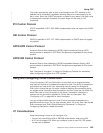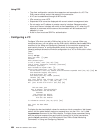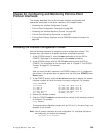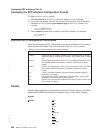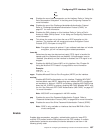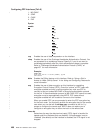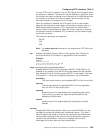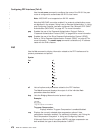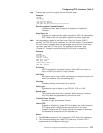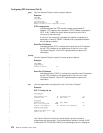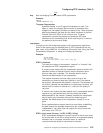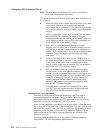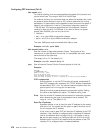ecp Displays the current Encryption Control Protocol state.
Example:
list ecp
ECP Options
-----------
Data Encryption enabled
Algorithm list: DESE-CBC
DESE (Data Encryption Standard Encryption Protocol)
Data Encryption Enabled/Disabled
Indicates whether data encryption is enabled or disabled on
interface.
Algorithm List
Displays the supported encryption algorithms. DES, as described by
RFC 1969, is the only encryption algorithm currently supported.
hdlc Lists parameters related to the High-Level Data Link Control (HDLC)
protocol. On PPP dial circuit interfaces, the “list hdlc” option is not available.
For dial circuits, hardware data link parameters are a function of the base
net rather than the PPP dial circuit. For additional information, see
“Chapter 47. Configuring and Monitoring Dial Circuits” on page 643.
Example:
list hdlc
Encoding: NRZ
Idle State: Flag
Clocking: Internal
Cable type: V.35 DCE
Speed (bps): 6400
Transmit Delay Counter: 0
Lower DTR: Disabled
Encoding:
HDLC transmission encoding scheme, either NRZ (non-return to
zero) or NRZI (non-return to zero inverted).
Idle State:
Bit pattern, either Flag or Mark, transmitted on the point-to-point link
when the interface is not transmitting data.
Clocking:
Interface clocking, either external or internal.
Cable type:
Specifies the type of cable in use (RS-232, V.35, or V.36).
Speed (bps):
The physical data rate of the interface. When clocking is internal,
this is the data rate generated by the internal clock.
Transmit Delay Counter:
Number of flags sent between frames.
Lower DTR:
Enabled or Disabled. If Lower DTR is enabled, the router drops the
DTR signal when a WAN Reroute alternate link is no longer
needed. Dropping the DTR signal causes the modem to terminate
the leased-line connection for the alternate link.
Notes:
1. The list hdlc command is not supported on PPP dial circuit interfaces.
2. This command displays the Lower DTR state only if Lower DTR is
supported for the configured cable type.
Configuring PPP Interfaces (Talk 6)
Chapter 33. Configuring and Monitoring Point-to-Point Protocol Interfaces 471



